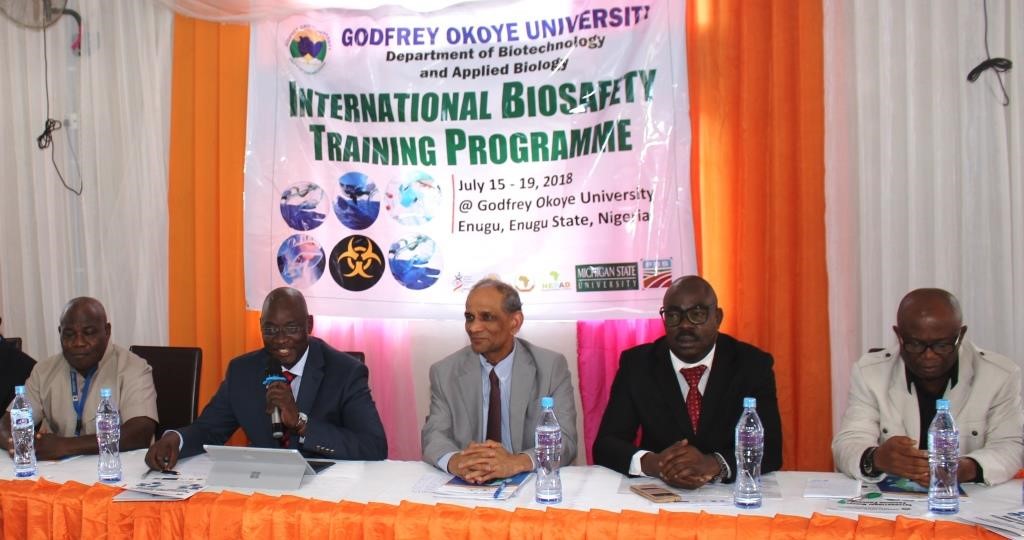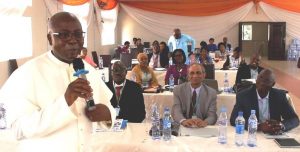
First International Biosafety Short Course implemented in Nigeria
From left to right are Prof. Edwin Onyeneje, Dr. Jeremy T. Ouedraogo, Prof. Karim Maredia, and Dr Mathew Dore during the opening ceremony.
NEPAD Agency ABNE in partnership with the National Biosafety Management Agency of Nigeria (NBMA), the Godfrey Okoye University (GOUNI), Michigan State University (MSU) and the Program for Biosafety Systems (PBS), successfully implemented an international biosafety short course at Godfrey Okoye University, Enugu, Nigeria, from 16 – 18 July, 2018.
Participants were drawn from various relevant stakeholder institutions such as biotechnology and biosafety agencies, academia and research institutions, as well as the media and women groups.
The main objective of this short course was to empower important stakeholders with current information on the safe management of biotechnology for socio-economic development. It also sought to provide a platform for networking among key actors to foster inter-agency collaborations and to increase awareness among key actors on their role, and the significance of having functional regulatory systems for biotechnology.
Official welcome and opening remarks were given by Prof. Edwin Onyeneje, Deputy Vice Chancellor of GOUni; Dr Rufus Ebegba, Director General of NBMA; Prof. Karim Maredia, Director of the World Technology Access Program at MSU; Dr Mathew Dore, Nigeria Country Leader for PBS; Dr. Ojuolape Solanke, West African Health Organization (WAHO); Dr. Jeremy T. Ouedraogo, Director of NEPAD Agency ABNE; Prof. Uche Ebe, Enugu State Commissioner for Education; and Prof. Engr. Patrick E. Ikpenwa, Enugu State Commissioner for Science and Technology.
All interveners welcomed participants to the biosafety short course and congratulated GOUni for this important feat. Prof. Edwin Onyeneje said that GOUni was particularly honored to host such an important event and thanked all partners who contributed to make this happen. Dr Jeremy Ouedraogo highlighted that “through this activity, the NEPAD Agency would like to reiterate its commitment to continue supporting Nigeria to build a functional biosafety regulatory system and build human capacity of high quality and thus fulfill the mandate of the ABNE.” Prof Engr. Patrick E. Ikpenwa, officially declared the short course open and affirmed, on behalf of his Excellency, Rt. Hon. Ifeanyi Ugwuanyi, Governor of Enugu State, “I wish to say that Enugu State is open to partnerships in this area and wish you a successful implementation of this program”.
Group picture of dignitaries and some participants
Later in the course of the day, Rev. Fr. Prof. Christian Anieke, Vice Chancellor of GOUni, who had been unavoidably absent at the opening ceremony, welcomed all participants, prayed for the success of the short course. He was well pleased that it was hosted by the University. He further stated, “I am still wondering what brought us into this field but maybe the hand of God brought us into this. Anything that has to do with biology has always been my interest”. “I am very happy the short course has taken up and is happening at GOUni for the first time in Enugu State and for the first time in Nigeria. Nigeria needs this kind of program, not for only training but also new ideas. So note that I, as Vice Chancellor of this University, am hundred per cent behind you in this course”, he added.

Rev. Fr. Prof. Christian Anieke, Vice Chancellor of GOUni, welcoming participants.
The short course was facilitated by NEPAD ABNE and Nigerian experts in the biosafety sector. Key topics addressed in the course encompassed an introduction to modern biotechnology and biosafety, myths and misconceptions about GMOs and how they are addressed, national and international frameworks for regulating biotechnology, public participation in biosafety processes, and biosafety resources and experience sharing.
Time was also allowed for participants to make contributions and ask questions. Food safety issues were particularly raised and experts reassured the audience that available scientific evidence shows that GM food is as safe as its conventional counterpart. Participants particularly appreciated the organizers for such an initiative, which is a real eye-opener on biotechnology and biosafety. The sustainability of such a training program was also emphasized and participants suggested that relevant stakeholders help to develop innovative ways of reaching out to all segments of the population from school children to farmers and the academia who are not familiar with modern biotechnology and biosafety.






